#aot meta
Text
Attack on Titan and Eren Yeager: Free Will, Determinism, and Compatibilism—A Question of Choice and Moral Responsibility
Compatibilism can be simply defined as the assertion that free will can be compatible with determinism—that is, they are not mutually exclusive and both can be true at once. It is a way to reconcile the problem of moral responsibility within typical deterministic arguments. Arthur Schopenhauer, a German philosopher, once said: "Man can do what he wills but he cannot will what he wills." Essentially, in a classical compatibilist argument, a person is free to act according to a particular motive, but the nature of that motive is determined. Attack on Titan represents the concept of choice under the framework of compatibilism.
Applying this framework to Eren—Eren could not help the way he was born; however, he was capable of exacting agency in his choices. He was born as someone with a monstrous will (as Levi described him as), someone desiring freedom at all costs; however, he was capable of weighing alternative choices and acting against that desire. He was also capable of understanding the moral rightness and consequences of both his desires and his choices, and he was also the ultimate source of his actions. Thus, Eren holds moral responsibility for those actions.
Levi Commenting on Eren's Nature During the "Female Titan" Arc:

Eren Telling Reiner He Thinks They Were Born as Who They Are:

Eren Telling Zeke He is Who He is Because He Was Born into the World:
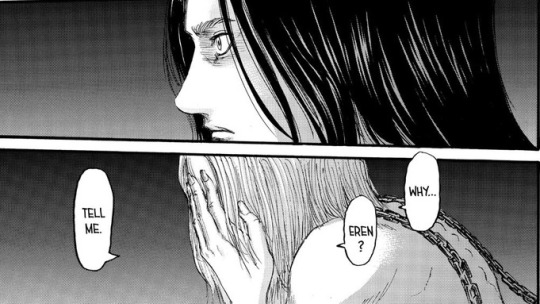

In causal determinism, "everything that occurs is the inevitable result of the laws of nature and the state of the world in the distant past" (X). Essentially, every one of our actions in the present has a cause rooted in the past, detached from our own actions. It implies that we cannot do anything other than what we ultimately end up doing and that we are not the causal source of our own actions, since all our actions are rooted in factors beyond our control. As such, if none of us have the freedom to do otherwise, it begs the question: are any of us responsible for our actions, even those of great evil?
However, classical compatibilists hold that the truth of causal determinism does not preclude one from having the freedom to do otherwise. Compabilists believe that causal determinism has no impact on our moral responsibility. In classical compatibilism, free will is typically defined as the ability to select among alternative courses of action. The choices themselves and the context of the situation may be determined, but choice can still be carried out within that context. Classical compatibilism, in this sense, can be visualized via a common "fork in the road" image:

Our presence at that fork in the road was determined and guaranteed, but we have the ability to choose which path to go on. Given the possibility of alternative choices, more than one future is possible if classical compatibilism holds true.
The common Classical Incompatibilist argument of determinism is as follows (X):
If someone acts of her own free will, then she could have done otherwise. (A – C)
If determinism is true, no one can do otherwise than one actually does. (D – E)
Therefore, if determinism is true, no one acts of her own free will (F).
As such, according to the argument, if determinism is true, no one has access to alternatives. Given that, only one future is possible in this argument of determinism. Attack on Titan seemingly supports this incompatibilist argument of determinism on the surface due to the fact that Eren only ever sees one future.
Eren Saying the Future Does Not Change:

Eren did indeed have access to multiple alternatives, however. Eren only ever sees one future in Attack on Titan because his alternative choices are rooted in the past and in his manipulation of it:
Eren purposely diverts Dina's titan from Bertolt to eat his own mother instead. The alternative choice would have been to let Bertolt be eaten.
Eren purposely convinces and forces Grisha to kill the Reiss family and take the Founder, even after Grisha had lost his nerve in doing so. The alternative choice would have been to let the Reiss family live.
If no alternative choices were available, Eren would not have had the capability of manipulating the past in the first place.
But, for the sake of argument, let us say that Eren did not have alternative choices. If he did not have alternative choices available, would that then be an argument that he had no free will? Another common compatibilist definition of free will is the ability of an agent to act according to their wishes, free of impediments. Take this explanation:
"On this view, freedom involves two components, a positive and a negative one. The positive component (doing what one wills, desires, or inclines to do) consists in nothing more than what is involved in the power of agency. The negative component (finding “no stop”) consists in acting unencumbered or unimpeded. Typically, the classical compatibilists’ benchmark of impeded or encumbered action is compelled action. Compelled action arises when one is forced by some external source to act contrary to one’s will."
Eren never acted contrary to his will in Attack on Titan. He wanted to do the Rumbling, and he did it.
Eren Saying He Wanted to do the Rumbling:

No one was able to convince or compel him to do otherwise. In Paths, he is originally shackled, but his will overrides the shackles placed upon him:

Later, when the Alliance is traveling to stop Eren, they attempt to converse with him in Paths to convince him to go against his own wishes, but Eren persists; he "keeps moving forward" against all obstacles to his desires. He refuses to negotiate with the Alliance, telling them that he refuses to engage in a discussion and that the only way to stop him will be by ending his life:
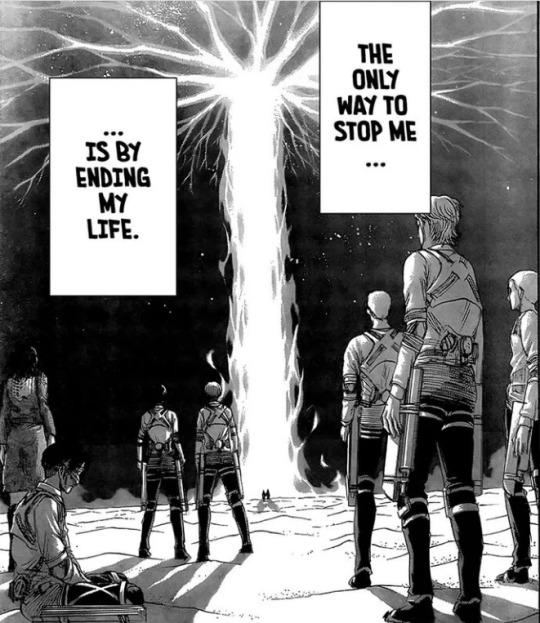
In response to these compatibilistic arguments, the Incompatibilist Consequence Argument posits that, in order for one to have freedom, one must be the ultimate source of their choices. The classic argument for this is as follows (X):
No one has power over the facts of the past and the laws of nature.
No one has power over the fact that the facts of the past and the laws of nature entail every fact of the future (i.e., determinism is true).
Therefore, no one has power over the facts of the future.
Consider defining "ultimate source" by the following explanation (X):
"An agent is an ultimate source of her action only if, at the very least, something necessary for her action originates within the agent herself. It cannot be located in places and times prior to the agent’s freely willing her action. If an agent is not the ultimate source of her actions, then her actions do not originate in her, and if her actions are the outcomes of conditions guaranteeing them, how can she be said to control them? The conditions sufficient for their occurrence were already in place long before she even existed!"
Attack on Titan specifically rejects this view of determinism, as Eren has the power to alter events in his own past to influence the future. He is the ultimate source of his own actions.
See @p-ssypink's response in this post:
Once Eren got to Paths in the final arc of Attack on Titan, he willfully manipulated the information his past self had access to in order to guarantee a certain outcome. He was the determinator of his own future.
Furthermore, consider these words from Hajime Isayama, the mangaka for Attack on Titan:
Excerpts from Hajime Isayama's Blog in 2016, discussing Minoru Furuya's manga, Himeanole (X, X):
Excerpt 1: "The serial-killer Morita's desire in life is nothing but to strangle people to death. Why is he a psychopathic killer? The manga portrays it as simply his nature. In other words, that's just the way he was born.
It's completely different from the usual concept of, "he's actually a kind boy, but was bullied to the point of killing and that made him realize how much he enjoyed it". It's true that he was bullied and that was a contributing factor. But even before he was bullied, he clearly said there was something 'not normal' about him."
Excerpt 2: "At first, he considered dying, because he felt he needed to erase the scum from the face of the earth. But before he died, there was one thing he wanted to do no matter what. It wasn't basketball or soccer or travelling to space. It was to receive sexual pleasure from strangling people to death. As many times as he could.
By coincidence, I am not a murderer. I think anyone who tries to understand others, even if you're not a murderer yourself, can still empathize to a degree.
'It's not like I chose to be born this way.'
It's about our nature from the moment we're born."
Excerpt from Isayama Hajime’s Bessatsu Shonen August 2017 Interview, discussing Attack on Titan's ending and Himeanole's influence on it (X):
Ultimately, I don't think the series passes judgment on what is "right" or "wrong." For example, when I read Furuya Minoru's "Himeanole," I knew society would consider the serial killer in the story unforgivable under social norms. But when I took into account his life and background I still wondered, "If this was his nature, then who is to blame...?" I even thought, "Is it merely coincidence that I wasn't born as a murderer?" We justify what we absolutely cannot accomplish as "a flaw due to lack of effort," and there is bitterness within that. On the other hand, for a perpetrator, having the mindset of "It's not because I lack effort that I became like this" is a form of solace. We cannot deny that under such circumstances, the victims' feelings are very important. But considering the root of the issue, rather than evaluating "what is right"...to be influenced by various other works and their philosophies, and to truthfully illustrate my exact feelings during those moments - I think that's what Shingeki no Kyojin's ending will resemble.
The above excerpts (and Eren's own words, as displayed earlier in this post) demonstrate that Eren could not control what he desired; he was born a monster. As such, free will is not entirely supported by the narrative of Attack on Titan. However, as has been demonstrated, neither is determinism. Compatibilism hence remains the best framework for interpreting Eren's character and his moral responsibility in Attack on Titan.
Eren was not a good person—he knew he was a bad person and that his actions in carrying out the Rumbling were wrong.
Eren Demonstrating His Knowledge That the Rumbling Would Be the "Greatest Act of Violence in History":
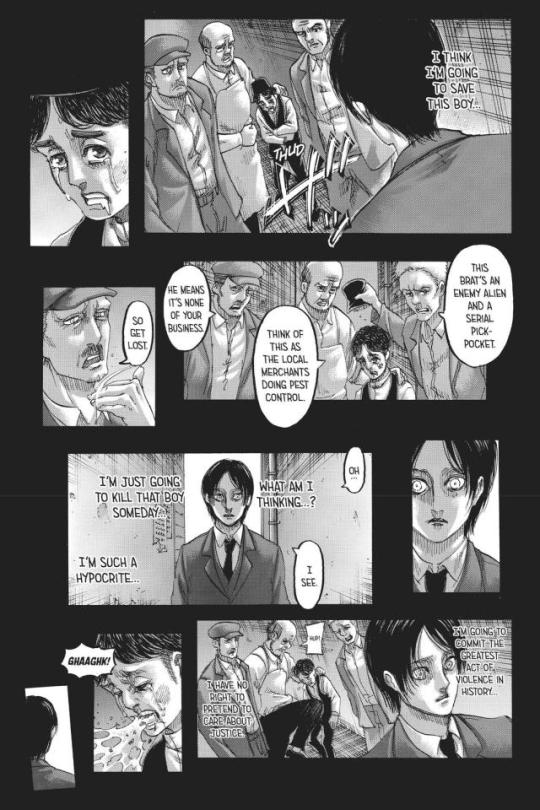
Eren Displaying His Guilt by Apologizing to Ramzi Because He Knew His Future Actions Were Wrong:
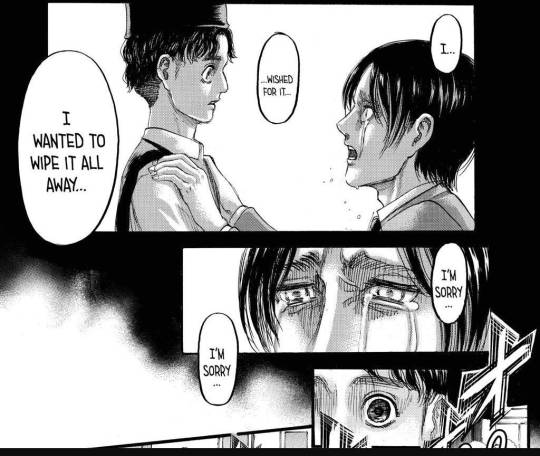
Although Eren could not control what he desired, he was responsible for the consequences that were generated, as he always had the capability of choosing otherwise and he was the ultimate source of all his actions. As such, his actions cannot be justified in any way to alleviate him of responsibility.
Note: This post was inspired by @cosmicjoke's last response in this chain and was created to elaborate on the points brought up in that response:
#attack on titan#shingeki no kyojin#eren yeager#eren jaeger#shingeki no kyoujin#aot#snk#attack on titan meta#aot meta#shingeki no kyojin meta#aot.meta#meta.eren#c: eren yeager#my thoughts#snk meta
25 notes
·
View notes
Text
Eren and Armin's friendship means so much to me. I am not even kidding, they are one of the aspects that I have always treasured from AOT. Isayama had me heartbroken with their bond slowly falling apart and his years-ago comment stating that 'Eren and Armin will not be friends at the end of the story'. Their final moments together in the anime gave me the closure that I needed that the manga failed to delivered.
Of course Eren would decide to tell Armin his motivation and secrets before he passed, and of course Armin would decide to keep them forever and share the burden of Eren's sins together. In hell.
Their relationship is just so complex and so sad. Armin shared with Eren his dream, which made Eren create his own. Eren's dream crushed Armin's, yet he was able to still show Armin that dream in paths and share it together. Armin told Eren that if he couldn't get rid of his humanity he would not be able to change anything, and in exchange, Eren made Armin remember the lives he had stolen in Liberio, yet tried to deny the darkness that is within Armin when he tried to voiced it out.
Not to mention, his sacrifice and wish to save Armin from that titan in S1 led to the discovery of his titan powers.
And Armin doesn't forgive him. He doesn't forgive him for the massacre he commited. He doesn't thank him for murdering eighty percent of humanity. But, in what some may call twisted, he manages to show Eren some compassion during their goodbye (and that in itself could spawn an entire one-hour video).
And I can't stop thinking about them. Ever.
420 notes
·
View notes
Note
PLEASE write about Levi’s mental state, i’m begging you
He’s faced death and precarious situations since he was born, yet he’s still standing strong and hopeful, WHAT THE HELL I LOVE MY SHORT KING
IT'S FINALLY HERE😭im sorry anon i hope you're around to see this and if u are i hope i dont disappoint
the tone in this analysis is so weird because i kept getting caught between 'this is an apa paper no contractions, academic language, double spacing -' and 'this is a tumblr post about a fictional blorbo wtf r u on'
i also use some scientific language i try my best to explain but if this turns anyone off i don't blame them because im unhealthily obsessed
*i'm a third-year undergraduate psychology student w/ a concentration in psychopathology
tw/cw: discussion of childhood exposure to sex (not assault)

Foreword
I’ve been putting this off for a while (I’m forgetful and this topic is intimidating what can I say), but being a year out from graduating with my bachelor’s to become a mental health professional, and being a Levi scholar(/hj), I wanted to give this a shot.
I wanted to dissect and examine Levi Ackerman’s mental health “currently” (as in general canon), and explain as thoroughly but as simply as possible how and why he thinks and acts the way he does.
Seeing how AOT is pretty renowned for leaving out the ‘insignificant’ details, especially character details, a good majority of my assertions and even details of his life are built off of correlations and “signs and symptoms”; meaning some things could be an aspect of Levi’s personality, or a symptom of psychopathology.
I will examine his childhood (especially his childhood), adolescence, young adulthood, and “present” adulthood, with a short summary at the end of where he might be mentally after the war.
*Lastly, I don’t like it when things I say about a series or character are taken as fact or make it implied that someone else’s thoughts are “wrong”. This is partly built on headcanons anyway, which are influenced by my own experiences. Don’t take away from this that this is me telling you what to think.*
Childhood
The most important period of development occurs in infancy and childhood, especially from the ages of 3-6. This is when a child learns where to find security, love, and basic skills, gaining stability as they develop.
Well, Kuchel died when Levi was 4.
Maternal Love / Learning Empathy / Anxious Attachment Style
Levi was born into deep poverty within a violent unwelcoming environment. Basic physical needs must have been very hard to meet (i.e., consistently fed enough, a clean environment, no physical threats). And where Levi was born is like the dictionary definition of a bad environment for a small child, excluding only his mother’s care and love.
As it’s generally understood in canon (and suggested from Levi’s special backstory manga so far) she was a caring parental figure early in Levi’s life that loved him unconditionally. We can conclude that Kuchel did everything within her power to compensate for both parenting Levi alone and shielding him the best she could from his horrible surroundings, teaching the kindness, goodness, and love that Levi would internalize and go on to strive for for his entire life.
As far as we know, no other children lived in the brothel. Socialization is just as important for a young child as receiving love. With this isolation, it’s extremely difficult to learn how to connect to other people, or pick up on social cues. Levi would’ve never learned how to interact properly with his peers—aside from use of aggression and violence which Kenny would go on to instill in him.
With the danger/anxiety imposed by strangers, mostly if not entirely men, he would turn to his mother for comfort all. The. Time.
And she would give him that support and affection of course. This early motherly affection is integral to child development: a child who receives empathy and affection is subliminally taught how to feel and express empathy towards others.
While Levi’s surroundings were dangerous, lonely, and chaotic—traumatizing enough for a toddler or young child—Kuchel provided a safety net from that, so I think that Levi developed an anxious attachment as a child: exhibiting clinginess, excessive fear of abandonment, and an excessive need for security and/or reassurance.
Paternal Trauma / Potential Androphobia
Born and living in a brothel, we can assume that Levi was probably seen as a burden and a mistake by others, especially by men (both the likely majority of her customers and her boss).

AOT ch69; Before the Fall, ch34
This is likely in contrast to the women (those living and working in the brothel like Kuchel). They should know Kuchel if not as friends, then acquaintances who could empathize for her and her son.
There’s an obvious trend here. If Levi is going to feel fear/danger/anxiety because of men, he should have a general aversion to men and-or the behavior of men who he encountered as a child. This is impossible to know for sure or in meaningful detail, but it seemed to be resolved by the time he became an adult if so.
Although Kenny in his words was no more than Levi's teacher, Levi did see him as a father figure.
The subject of Kenny will be expanded on later, but it's clear Kenny in no way resembled a father, who also would go on to abandon Levi (at the age of 11 or so). Children without father figures tend to struggle more emotionally, psychologically, and socially. Specifically, (especially boys) tend to exhibit intimidating/aggressive personas to compensate for resentment, fear, and unhappiness.
Sexual Trauma (Tangent, Probably)
This is unconfirmed but a likely trauma Levi went through: exposure to sex as a child. There’s no way to confirm what he experienced, so I’ll function on ‘probably’s’ and ‘most likely’s’.
Because Levi and Kuchel only lived in one room, other rooms in the brothel should have belonged to other women, and he was at the oldest four, I wager that he was babysat by women who Kuchel knew and/or was made to hide somewhere while she worked, such as in a cabinet.
(for reference)
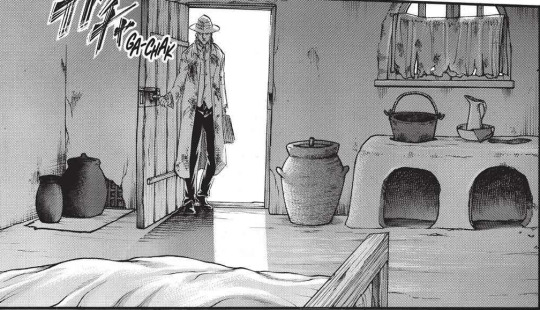
AOT ch69
The odds are high that he was exposed to the aftermath of sexual violence (i.e., marks seen on his mother), and the sound or smells that have to do with it. That young, he wouldn’t know what it was, but he should have realized later as an adolescent.
In general, children regardless of gender exposed to sexual content usually experience early puberty (which is just as likely for impoverished children, or children who experience chronic high-stress in general); issues with intimacy; become desensitized to high-risk behavior; negative/inaccurate expectations about sex and relationships in the future; influence inappropriate behavior with other children or adults; sex addiction.
This is especially relevant to Levi’s fear of closeness/intimacy in the future. Exposure to sexual situations—possibly not including CSA in his case—very early in life inflicts on a child emotions and stress they don’t have the intellect or reasoning to process or understand. An extreme aversion to interpersonal relationships, especially physical ones, results.
This stress Levi must have felt, being powerless to this happening to his mother, is a different beast. Children aren’t capable of handling high levels of stress, and so the brain will automatically create coping mechanisms: dissociation (a severe form of “zoning out”; observing the self “from the third person”; numbness; the feeling of living in a dream), excessive daydreaming/overactive imagination, symptoms of PTSD (nightmares and terrors; flashbacks; spontaneous activation of fight-flight-freeze associated with anxiety; excessive worrying/fear; loneliness/self isolation). PTSD will also be prevalent in Levi’s later life, which I’ll delve into later.
Inappropriate behavior and sex addiction are also highlights for me because they shouldn’t exist in him based on Levi's personality and behavior throughout the series. In my opinion, Levi ought to associate sex with pain, shame, and violence; he does see it as an ordinary job—a means to an end. He should be desensitized to sex as a concept, but associates it personally with shame, sadness, and pain, possibly feeling disgust towards it. So it is highly likely that Levi in every stage of life following this experienced sexual repulsion (usually associated with high anxiety towards sex), a low libido, or a lack of sexual desire entirely.
From a trauma perspective, he could avoid sexual topics of conversation, sexual settings (i.e., brothels), or an array of things which are sexually suggestive or he as a child possibly associated with sex (i.e., cleavage, panties, specific touch). Similarly, he might avoid direct reminders or have a post-traumatic reaction to them, such as anxiety or flashbacks (i.e., the sound of a bed creaking, the sight of wet clothes).
Importantly, it can be concluded that sexual violence was often exhibited, and the idea would be ingrained in him that sex, like everything else besides his relationship with his mother, is “give-and-take”, “victim-and-attacker”, and learn to be repulsed by intimacy. This impacts his willingness for later friendships and relationships as we’ll see later.
Early Abandonment & Early Exposure to Death
As Kuchel’s health deteriorated, Levi’s sense of security would break down. Availability of shelter, food, and emotional support would be even less secure than before. He might have been providing for Kuchel for some time, even, as it can be gathered that he received little to no help from those around him while she was sick. To whatever length he had to take responsibility and both fear for Kuchel, this would cement a sense of responsibility and guilt in him from the age of just four years old.
He will fail to save her—regardless of the fact that that’s not his responsibility in the first place; a child wouldn’t understand that—and then lose her with nothing he could do to even cushion the blow.
How powerless he must’ve felt. How hopeless. How likely is it that Levi found comfort in joining her? A child his age wouldn’t be able to comprehend death, basing our understanding on Piaget’s theory of cognitive development. To summarize, at the age of six or seven, children aren’t capable of complex, abstract thought like death or the finality of it. But Levi had to learn early.
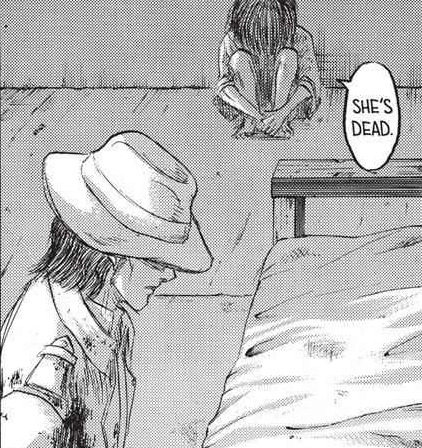
AOT ch69
This will be center in his “clean-freak” tendencies later.
Adolescence
Most of this section is going to be rather vague again, but we already got the bulk of that over with in childhood!
Emotional Train Wreck / Lack of Identity
It’s hard to notice if you’re not paying attention, but in every scene we’re shown with Levi after his mother dies but before Kenny leaves, he’s wearing some variation of his mother’s one dress styled into a shirt. He loves her endlessly, even or especially in death. And part of cherishing her memory, to him, should’ve been taking after her as much as he could.
That’s how to explain why he didn’t become a cruel person (Kenny for instance) as he grew into a teenager, even though much of Levi’s outlook and behaviors come from him (ch57).
The more pertinent question is how extreme violence, reinforcement of the idea that that violence is power, and Kenny’s total (or most likely total) lack of communicated emotional connection affected him.
Levi would still desperately want that connection deep down, especially with his mother gone. This is a major reason why Levi sought to get stronger to please Kenny. For chronically abandoned people, that continues into adulthood and even beyond. A hole inside which can't be filled.

AOT ch69
Chronic loneliness—like I explained before—basically explains his aloof nature and awkward disposition. It’s not that Levi feels as detached as he looks, but he doesn’t know how to express himself or open up. He wouldn’t learn how to process his emotions, let alone talk about them. He’s basically emotionally stunted and immature in impersonal relationships (between friends and especially in regards to intimacy).
The Underground’s environment also makes him socially awkward, rude, of course stoic/not very expressive, and blunt. Levi was forced to become extremely observant of people to suss out their intentions, remaining vigilant of his surroundings at all times.
Levi doesn’t even get affection in any sense anymore. He doesn’t get a hug or a pat on the back, and he certainly doesn’t get a shoulder to cry on.
If anything, Kenny would punish him for showing weakness. Vulnerability is weakness; weakness is death.
What results is a continuous and boundless sense of emptiness inside that can’t be filled. He’s plagued by a chronic sense of unbelonging and loneliness. There’s no time or opportunity to develop “normally” as an adolescent. Socialization is limited at best; thinking of his place in the world is irrelevant when his one and only most pressing goal is survival; he doesn’t get to explore hobbies or interests.
OCD Propensity
One “interest” Levi is passionate about is cleaning, at least. Disease is what caused his mother to die. The easiest cause to point to would be their disgusting surroundings (although, Kuchel was infected by a customer). It is canon that Levi’s love of cleaning comes from "his personal experiences". In that interview, Levi first specifically references the important of fighting disease.
In other words, his "clean freak" nature comes, primarily, from the death of his mother: Filth -> disease -> death, and abandonment by extension.
His mother would’ve encouraged him to keep their room clean. There were times he or she had to have come down with something and dirtiness was the cause. On top of Kenny’s enforcement to keep up “clean” appearances to garner respect from everyone else in the Underground.

This in particular is extremely relevant to his mental health. When someone feels out of control of what is happening to them, especially in a recurring way, and especially as a child who doesn't yet know how to feel stable in an unstable environment, they look for something to control. It can be weight, bodily functions (blinking, breathing, etc), dominance over others, or cleaning, for instance.
Fear of disease, the urgent need to have control, and the basic need for stability makes it obvious that Levi would become obsessed with cleaning. And moreover, developing OCD (Obsessive Compulsive Disorder). I’ll go deeper into this diagnosis later.
Lack of Self Worth
Despite the acknowledgment throughout canon that he trusts in his own strength, it wasn’t always that way.
Canonically, Levi sought praise from Kenny by showing his strength because that was the only thing he received praise for. The conclusion Levi came to once Kenny left him was that he wasn’t strong enough (wasn’t good enough) to warrant staying with him.
In conjunction, Levi’s first conclusion was that he did something wrong, not that Kenny possibly had some obligation that forced him to leave the Underground, pointing again to his own lack of self-worth.
This scenario created a complex in him, the very root cause of Levi’s pain, the very foundation of what Levi would go on to prioritize in adulthood. If he isn’t useful to those he wants not to abandon him, he’s worthless. He’s only useful when he shows his strength. Every other aspect of him like his interests is either irrelevant or bland by default in his eyes.
He would go on to make it his mission to try his best to be good enough in order to save and protect the lives of others, but foremost those he cares about.
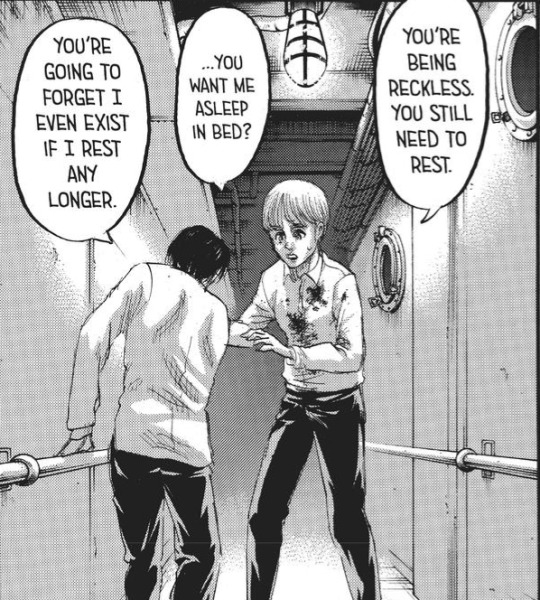
Young Adulthood
Our first exposure to Levi as an adult is in A Choice with No Regrets, his OVA/backstory.
(By the way, I’ll be basing this analysis off a mix of the manga and the OVA.)
Emotional Immaturity/Affective Dysregulation
Generally, Levi’s defining negative character trait as a young adult is his emotional immaturity/anti-social behavior. Yes he’s grumpy and rude which is always indicative of him, but he’s very quick to anger, too. He cursed at the Squad Leader who offended him (by assuming that because he, Isabel, and Farlan are from the Underground, they’d be dirty), and argued furiously with Farlan that he would kill Erwin—not because it was required for the job, but because he disrespected him—for a few examples.
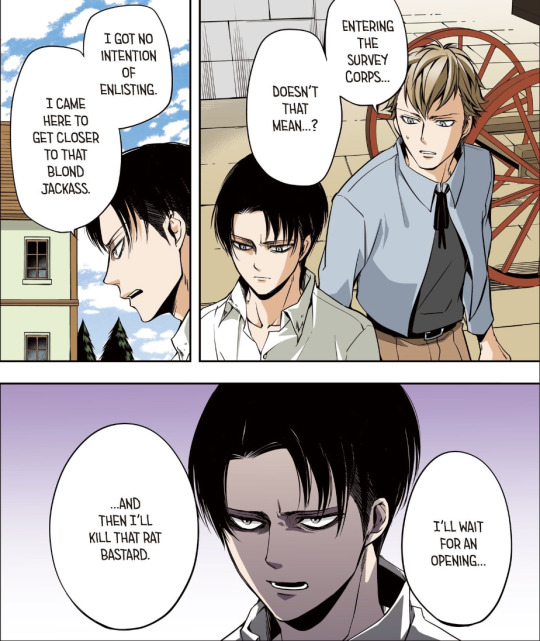
ACWNR ch2
He tended to be arrogant, too. Such as when he ultimately called a Scout who had experience with the Titans stupid for telling Levi to hold his swords in a certain way. He spoke to every officer the same as he would anyone on the street, having a remarkable lack of basic respect for authority. He was insistent on distancing himself from the entire setting and structure of the Scouts as much as possible, both to not get attached, and he found their mission childish/foolish.
He’s rather selfish. There is nothing Levi cares about genuinely more than Isabel’s and Farlan’s lives and the job that will set them up with a good future. Farlan’s advice is the only one’s he takes and the only judgment outside himself that he considers, such as when Farlan asks him to not cause trouble with authority to keep a low profile, but even then he acts stubborn. Levi trusts nobody wholeheartedly except himself (until later in ACWNR).
There’s a cognitive dissonance in him. Growing up, and still as a young adult, Levi’s headspace is marked by fear and uncertainty, with his power as his source of confidence. The first time he kills a Titan (with Isabel and Farlan), he uses too much gas because he refuses to potentially risk his friends’ lives; when the expedition is upcoming, he abruptly tells Farlan and Isabel to find a reason to stay back, and that he’ll complete the dangerous part of the job on his own.
Levi is full of repressed fear and uncertainty. He hides and/or buries all of it for the sake of self-preservation both emotionally and physically.
Antisocial Personality…?
It’s extremely interesting how a character as selfless, heroic, and empathetic as Levi exhibits antisocial symptoms. I’d even argue that if his childhood was spent entirely without his mother figure, then he might be a dictionary definition of ASPD (Antisocial Personality Disorder).
People with this disorder live day-to-day under the constant assumption that whoever is around them is “out to get them”/searching for a weakness to exploit. Humanity is made up of only prey and predators; morals are completely subjective, perpetuated by the society that surrounds them. This constant need to defend oneself, the effect of the exact trauma the potential sociopath experienced, combined with a muted emotional spectrum, results in a complete disregard of everything, including people outside of themself. They might believe they’re entitled to comfort or admiration, but overall, they’re intensely self-serving, often aggressive, and ruthless.
Because Levi for instance learned to rely on violence both for “love” and survival, then he might fall on violence to manipulate a person or situation into serving himself. I see reason to believe that Levi could have grown into worse than Kenny’s image if it weren’t for his mother’s influence.
However, the greatest cause for deniability is Levi’s wide emotional spectrum (especially including empathy and shame), while a lack of shame is the most significant marker of ASPD . (It is arguably one of many testaments to his strength that a victim of so much suffering, violence, and cruelty could become a man as empathetic as him.)
However, these tendencies may still be relevant: A sense of arrogance—both to the way Levi thinks of some who he perceives as weak and live without good morals—lacking issue with using deceit or violence to attain a goal, and living outside the rule of authority.
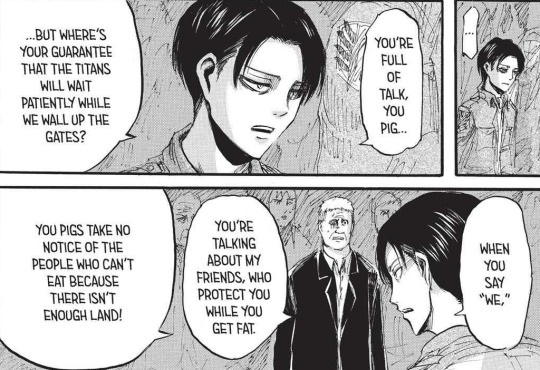
I go into more detail about this idea here.
Conclusion
As is true in general, there’s very little to say of mental development once someone has reached their early–mid-twenties. What we know of Levi’s young adulthood does reinforce his fear of abandonment, but he finds a cause where his strength and compassion can be “put to good use” and give to him a life that is worth living.
Conclusion: the ‘Present’/Diagnoses Overview
C-PTSD (Complex Post-Traumatic Stress Disorder)
Levi’s emotional dysregulation (i.e., inability to sit with and process negative emotions), his difficulties in relationships, insomnia, negative worldview, absent sense of self, and finally, his persistent sense of unworthiness/worthlessness are all indicative of C-PTSD. It’s distinct from PTSD in that he didn’t endure one short-term traumatizing event, but he grew up surrounded by trauma and saw it as normal (e.g., gang violence, extreme poverty, death of a parent, (more presumably) physically and emotionally abusive parental figure). Levi as a child developed no understanding of a nurturing, secure environment.
Negative/Absent Sense of Self
I’ve talked about this at length already, but it’s worth noting how Levi’s perception of himself must have changed when it was revealed that he is extremely strong physically not from his own efforts as much, but because he’s an Ackerman.
His self-confidence and self-worth have always been built on the foundation of his strength. He’s useful if he’s strong, so he’s worthy if he’s strong. Along with the extreme high pressure his goal to kill Zeke put on him in season four, he might have gone to extreme measures to compensate for his strength he might have felt was “unearned” (such as excessive exercise for example). This is an aside, but it was a blow to him for sure.
Emotional Dysregulation
The causes of emotional dysregulation generally which he experienced are as follows: early childhood trauma, feelings ignored, judged, or invalidated at a young age, and physical and emotional child neglect. Beyond his first four years of life with his mother, Levi experienced all these things (early exposure to sex and likely exposure to domestic violence aside).
It’s important to focus on emotional neglect specifically, when any and all perceived “weakness”, no matter how small, is unacceptable to Levi. He will never ask for help (being independent to a fault), he can’t define or process his emotions, and it doesn’t occur to him—and it could be a shock—when he learns that his friends care about him, not him insofar as how useful he is.
As an adult, Levi appears to be emotionally mature, but I argue that this isn’t the case. It’s more accurate to say that he has better control over his emotions (in that he buries them or ignores them) with a mature outlook because of all his experiences with suffering.
Similarly, he’s not outwardly emotional not because he’s antisocial (as related to ASPD, not introversion), but because he’s so “emotionally constipated” that he’s numbed the vast majority of the time.
Relationship Issues + Fear of Abandonment
Because of his fear of abandonment and impaired emotional intelligence in close relational conflict, he’s extremely passive and/or passive aggressive. In order to avoid potential abandonment, he doesn’t go out of his way to win major arguments—such as threatening to break Erwin’s legs if he didn’t stay away from the expedition in season three, but ultimately giving in. He’s also more likely to sneak petty insults into arguments, give “silent treatment”, slam doors, etc. His kindness and exceptional empathy shouldn’t let him be physically or overly violent.
These are likely additions to why Levi doesn’t foster many close relationships.
Fittingly, as a child I thought that Levi might have had an anxious attachment style (clingy, excessive need for security), but as this possibility for security was removed entirely, and he was taught to not rely on others, he would develop more of an overt avoidant attachment in adulthood in combination (fearful-avoidant): making very few emotional demands—even though he has needs—withdrawing when there’s conflict, acting aloof yet fearing abandonment, having difficulty expressing emotions he feels intensely, and fear of depending on someone else.
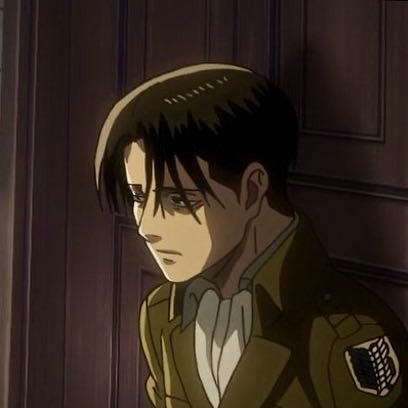
Anxiety
His cool-headedness even in the heat of battle/war (other factors like experience aside) is exactly what you would expect from someone diagnosed with C-PTSD; he’s accustomed to chronic high-stress. But small stressors (i.e., a change of plans) are overwhelming and make him quick to anger/excessive annoyance.
OCD
Emotional dysregulation is also closely associated with OCD.
OCD is much much more than being concerned with keeping clean or organized. OCD is an anxiety disorder composed of anxiety-related obsessions and compulsions, such as frequent and disturbing thoughts or images (intrusive thoughts). These attempt to be managed through rituals (i.e., handwashing, counting in patterns). Although symptoms will fluctuate with anxiety, OCD at its baseline is a distressing disorder.
Since he was young, Levi should have had an incessant need to be in control at all times. A shining example of this is his mother’s death, an incident he couldn’t control but included dirtiness/disease as a cause he could pinpoint, so this anxiety with dirtiness becomes a major obsession, and the compulsion is cleaning. (Putting aside the fact that Levi enjoys cleaning by itself too.)
It’s a widely-held belief that if Levi has OCD, it’s contamination OCD, as it specifically has to do with an obsession with dirtiness and a compulsion in cleaning (i.e., damaging handwashing, ritualized bathing that may take hours). However, based on the multitude of times Levi was covered in blood and remained unbothered by it (Titan and human), and in fact the obsession’s lack of relevance entirely during urgent missions/situations, contamination OCD is simply not plausible. Instead, it’s general OCD.
There’s no way to know for sure, but I don’t see his OCD as mild or severe. Levi is an extremely orderly and balanced person, so it can be concluded he must have things done a certain way, routinely, organizational, or planned; when the dirtiness is “negative” (i.e., Titan blood, blood on a knife he used to kill Isabel’s attackers), he is never more rigid with cleanliness; it’s probable he suffers intrusive thoughts (likely of the violent nature), a fear of contamination, and/or counting ritualistically, but the most obvious compulsion is cleaning. He might have sensory issues, such as disgust if he happens to brush shoulders with a stranger; aversion to particularly bright lights, irrational rage towards “mouth sounds” (i.e., chewing, coughing, swallowing), etc.
EDNOS (Eating Disorder Not Otherwise Specified)
Levi should have a complicated relationship with food to say the least.
In the realm of eating disorders, EDNOS is sort of a catch-all term when an individual doesn’t qualify for the diagnostic criteria of anorexia or bulimia, and it encompasses lesser-known eating disorders like Pica. It’s the most common diagnosis for clinical eating disorders.
I already covered how integral the early years of life are, and beginning at a young age, if children aren’t given a basic need like food, and they must seek out food on their own, it becomes an anxiety deeply rooted in the brain regardless of how well-fed they are when they’re older. There will always be an urge to have food available. Levi’s years in the Underground were spent either actively starving, or going about every single day having acquiring food as top priority. He was a young adult when he left, so it’s impossible to unlearn this (without extensive therapy, which Levi doesn’t seek). It’s similar to compulsions found in OCD: even though he logically knows that there will be a dinner after lunch, it’s impossible to put aside this worry.
That may mean always having food stashed, eating too much—especially in his early years Aboveground when he’d eat as much food in a day than he’d eat in a week Underground— stealing food, or eating way too quickly (as someone who lived in a place where food was considered something of a luxury resource and threatened being stolen at any time).
The latter factor contributes to Levi’s suggested preference to only eat alone—joining the fact that Levi only eats with Erwin after expeditions. Eating in front of others should be considered a weakness to him.
As time passes with this easy access to food, combined with his extremely narrow sense of what makes him “good enough”, his relationship with eating may become toxic. Especially when the stakes of his worthiness are so high—literally life and death. He may think that he’s privileged to eat at all, and when he feels worthless, he restricts himself from that “privilege”.
He may be so accustomed to the feeling of hunger, that it doesn’t immediately register with his mind when he is hungry.
Lastly, he may have a generally low appetite. This is often associated with depression, but depression is comorbid with C-PTSD.
Misc.
Some tangents/miscellaneous speculation about Levi’s psychology:
Queer?
Sexuality is formed and shifts due to a wide variety of factors, which most if not all are terribly understudied: genetics, hormones, and your environment/experiences. So again, my speculation.
With his fear of close relationships and negative experiences with sex, I think he should land somewhere on the queer spectrum, specifically under the asexual or aromantic umbrella (i.e., pansexuality/being panromantic (attraction to personality) and demisexuality/being demiromantic (attraction only to those he has an emotional connection to)).
MDD
The odds of Levi having MDD (major depressive disorder/clinical depression) are iffy. Most if not all of the symptoms are comorbid with childhood trauma and C-PTSD: Such as persistent apathy, guilt, and/or discontent; sleeping too much or too little; lack of energy; reduced or heightened appetite; irritability.
Oftentimes, depression, C-/PTSD, and related mental illnesses cause unexplained physical pain, such as back pain and occasional tension headaches. “Stress hormones” like adrenaline are built-up in the body, and usually persist without physical therapy and-or medication (Disclaimer this mention is based on nothing more than Levi always standing with at least one hand on his hip).
Body Language
Similar can be said of his body language from a cognitive perspective. The vast majority of the time, Levi has himself closed-off in some way, usually by crossing his arms to protect his chest; a subconscious barrier between oneself and another person.
Also see this official art of Levi asleep.
Afterword
We’ve known it’s not just Levi’s physical strength and skill that makes him the strongest, right? It should take immense mental strength to make it day-by-day dealing with the trauma and issues that he does, but not only has he survived and continues to, but he lives heroically, selflessly, with the wellbeing of everyone around him as a top priority. He buries all of his pain by moving forward always and without exception regardless of how painful the present is. Living with “no regrets” should in mental respects be a guise for pushing his trauma down, too; there’s just no words that can properly do Levi’s resilience justice.
Part of me wants to go into detail about his later adulthood, but given how very little we know (right now), I think it’d be too speculative.
However, based on what we have seen at the ending of AOT, it’s comforting to know and plain to see that Levi wasn’t defeated when he “lost” the reason to be so strong, and even his strength itself; he didn’t lose his love for his friends nor of life.
In middle age, based on Erikson’s psychosocial stages, the conflict that should enter Levi’s life is the idea of generativity versus stagnation. He seems satisfied with his life despite the negative effects of all he went through—grief, physical disability, inevitable mental scarring—and he’s still concerned with helping others, especially the younger generation in a world after the overwhelming devastation that was the Rumbling.
My speculated psychopathologies/diagnoses of Levi:
C-PTSD (insomnia prevalent)
OCD (contamination obsessions)
EDNOS
#levi aot#snk levi#levi ackerman#levi attack on titan#captain levi#captain levi ackerman#aot levi#aot levi ackerman#attack on titan levi#aot meta#levi heichou#rivaille heichou#levi rivaille#rivaille ackerman#lance corporal rivaille#levi snk#levi.thoughts#aot#attack on titan
249 notes
·
View notes
Text
I’ve been thinking lately about how much the ‘curse of Ymir’ really does affect the psyche of each of the nine shifters and how it impacts the ending of the story.
Up until the end of Season 3/Chapter 87-88, the reader and the viewer have no idea that the shifters have a limited amount of time to live. They seem to possess this god-like power and they can rejuvenate and survive almost any injury. They seem unstoppable.
This is what motivates Erwin to create a plan to take one of the nine shifter powers with the serum- having another Titan in your arsenal would make a difference in winning the war.
But what the Paradisians don’t know is how holding the power of the Nine just perpetuates a cycle of violence and cruelty. It’s a curse as much as it is a power. No matter how brilliant or grand your scope is for what you can do with this near limitless power, you have to contend with the fact that you will only have thirteen years to do it.
This revelation to me is the what colors the entire last arc of the story leading into and after the time skip.
For Zeke, it amps up the level of desperation he has for accomplishing the euthanization plan- relying on Eren was still a variable that was largely unpredictable, and he trusted him more than he probably would have if he weren’t running out of time.
Going back further in the story, it retroactively explains why Ymir (of the cadet corps) would go back with Reiner and Bertholdt at all- a seemingly nonsensical choice when it seems she has something to live for in her relationship with Krista/Historia. But Ymir knows she has little time left. She has no future. So she chooses to surrender.
For Annie, it shows her desperation to get back to her father, a man who showed her very little affection, and yet if she could just make it back maybe she could live at least a year or two with him and make at least one happy memory with the man who raised her to kill.
Armin, I honestly feel the most for, because what he and everyone else thought of as his salvation, was actually just saddling him with a curse. And heaps of responsibility to try and be grateful for it. He went from a character with a singular and wholesome conviction, to someone wracked with guilt and forced to solve the world’s problems with limited time and resources.
In Reiner’s case, I actually think the fact that he knows he is going to die is the only thing actually keeping him alive in the tail end of the story. He wants so badly to face retribution for his deeds, and he can only find the strength to keep towing the line because he knows his violent demise is guaranteed.
Characters like Pieck and Bertholdt seem to accept their lot in life- but deal with this internally and develop their own sense of morals despite it- albeit in different ways and in Pieck’s case with a shade of pessimism. Falco and Marcel stand out as a characters who see the farce for what it is- but still want to subject themselves to it in order to prevent someone they love from suffering through it in their place.
Eren, though, it’s easy to see how discovering he has already lived more of his life in powerless ignorance than what he has left is what ultimately causes the collapse in his character. Combine that with the way that he sees ‘future memories’ and doesn’t see any future beyond his own, and suddenly you have a naturally impulsive and violent person living in the most fatalistic reality ever. It makes perfect sense that his fall from grace is near immediate and precipitous.
What difference does all that power make if all it means is that you become a tool for destruction with no future? That you will be forced to curse someone else so that this cruel power will continue to exist? That is the true legacy of Ymir and the Eldian Empire- you can have near limitless power, but you will never have true control over your own life.
And it makes for such interesting discussions and questions about power and mortality and agency- and all the seemingly ‘correct’ and ‘incorrect’ ways to respond to their dilemma.
Anyway, it is always ‘thinking about the moral quandary of the titan shifters’ hours around here…
#aot meta#character analysis#titan shifter#attack on titan#zeke yeager#bertholdt hoover#annie leonhart#armin arlert#ymir#pieck finger#falco grice#marcel galliard#eren yeager#reiner braun
119 notes
·
View notes
Text
Can we talk for a second about how Levi always refers to the members of his squad by their first name. In Japan, referring to someone by their first name is significant. Its more typical to refer to someone by their family name if you don't know them all to well. Close friends even still use honorifics, such as [Name]-chan. There's several instances where Erwin refers to the newer cadets by just their last names, which is typical in a military setting even in other countries, but Levi calls the 104th kids by their names, Armin, Jean, etc.
Levi obviously doesn't care for honorifics or typical social niceties -they didn't really matter where he grew up anyways- but to me him referring to them by their first names -even as they call him Captain (heichou)- means 'we are equals, I trust you'
374 notes
·
View notes
Text
I wanted to talk about this scene for a while now:



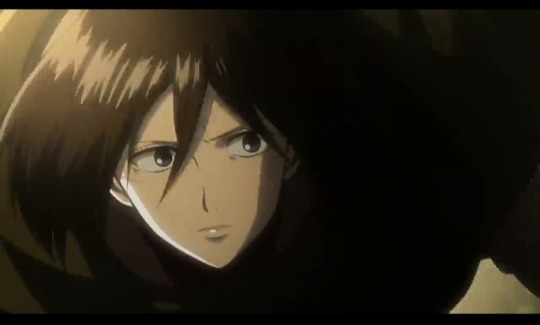
First of all, when Mikasa obviously very upset and raged up by female titan kidnapping Eren, she vents her anger out by blaming Levi for not being able to do his job of protecting Eren. I don't think she knows much about how the whole squad got killed by Annie.
But, Levi instead of snapping at Mikasa or getting offended by her furious statement, he chooses to not react on it. He just saw his squad dead and is definitely depressed.
The look on his face after Mikasa said that, turns grim and he looks too tired. He looks like that while returning from expedition and facing Petra's dad too. I think, the statement actually hit him more than it shows. It looks like he ignored it, but the grim look said otherwise.
He was definitely blaming himself for not reaching out there in time to save his precious squad members and was already suffering from their loss of lives. And Mikasa's statement worked like lemon on wound.
He didn't react, it's not like him. He also is a very understanding adult, for he chooses to not think Mikasa as rude for saying that. He understands she is just 15 and how Eren is a special person for her, having him taken away and endangered always make Mikasa recklessly furious. But also, I think, he thought that those words were true, he thought that it was his shortcoming for not reaching there on time.
He understands that he can't save everyone, but it's this sad realization for him that pains him the most. Being called humanity's strongest and then not being able to wondrously saving them. He sure lost and sacrificed the most, considering his closest people and friends are all dead.
He is too selfless and goal oriented ( saving and protecting humanity) that he won't wallow in self pity and he never did strike me as someone who would ponder over things he couldn't control, he did rather do something productive and make a difference. But this feeling of not being or doing enough definitely always there somewhere in his mind, he just brushes it off and focuses on what he can still do.
He lost his whole squad too, but he chooses to put aside his pain and understand Mikasa's. He was never the one to complain about his life either. He is just to selfless to do so.
This scene was a really good point for his character, how he is an understanding and thoughtful adult. How he does get affected by deaths severely and doesn't show it. How he might actually blame himself for not being able to save lives.
I don't think Levi would have too much guilt, in a way Erwin did. But he definitely sometimes blame himself for what's lost, that is not even his fault. And just shows how even a person who has been through and seen so much deaths and suffering, can still be so vulnerable to it.
Levi has treated every life as precious and meaningful, loss of this life he considers so precious and not being able to do anything, when situation is totally our of his hand, can make him depressed too. As I already said, he would still brush off those thoughts and not ponder on it. He would rather do whatever he can to help, to make sure that those lost lives weren't in vain.
For Levi not only life has meaning and worth but death does too, he will do everything in his power to give meaning to both the lives and deaths of his comrades.
#levi ackerman#attack on titan#aot#levi aot#levi attack on titan#levi#shingeki no kyojin#levi fanart#levi character analysis#kikarou rambles#aot meta#kikarou metas
136 notes
·
View notes
Text
no but the most tragic thing about shifters is how their appearance contrasts their experiences
because the regeneration works so well that it doesn't leave any scars on their bodies. their flesh is so unscathed and perfect - hell, shifters don't even have callouses that's how fast they heal - and it doesn't show just how much they went through as warriors. any horrible wound that may be deadly for a normal human they can recover from all the while suffering under the same pain.
they all should be dead ten times over yet the regeneration keeps them alive and acutely aware of the most fatal, painful and traumatic of experiences and with no marks to ever account for it. you wouldn't be able to guess what hell they were forced to live through just because their bodies are that durable
the only thing that the regeneration is unable heal is their minds which most certainly are deeply damaged due to everything they've gone through
218 notes
·
View notes
Text
people like to characterize levi as the guarded one, and while that's not an unfair assessment, levi is emotionally guarded, not personally guarded. levi is unflinching in his pursuits, his values, he leaves nothing to the imagination. he's unapologetically himself and regardless of what happens he can't seem to shake his internal drives: his continued belief in fighting for better, in honoring others, in acting in service of things beyond him.
its actually erwin who i feel is the inverse, erwin is clinical, he's constantly crafting, which doesn't negate his sincerity, one of his major components is sincerity, but its an obligatory thing, smth afforded to others. erwin uses service as a mechanism to achieve his actual ideals, whereas levi is driven by service as an outlet for his individualism. however, erwin's passion is what makes him such a good leader. naturally.
eruri are both on the introverted side, hence their symmetry, the onus of externalization and adjustment is eliminated, they're attuned to one another. levi provides certainty and erwin direction. and they both feel safe within that, however, bc erwin had to kill a key part of himself, burying his deviance in order to ascend, he defers to half-truths and obfuscation, its a safety mechanism, the only way attaining power to realize his true passion was possible. the passion we see is only residual, indicative of the flame that truly burns within.
erwin affords only glimpses.
he's paradoxical in that — an at heart withdrawn, observant kid with a fire bright enough to fashion him into the devil. someone subsumed by that which they buried.
he internalizes all the horrors and lets little else color him in the eyes of others bc they have been his persistent norm, he buries his in actuality, juvenile and senseless self, and in doing so, the person he sees as a paragon, the person who the people idealize sees one often framed as cold and unfeeling by others as the truly elevated one, bc in burying his own light, erwin is able to see it in levi.
#eruri#aot meta#erwin x levi#erwin smith#levi ackerman#shingeki no kyojin#aot eruri#snk eruri#levi aot#captain levi#aot erwin#commander erwin#aot#snk
144 notes
·
View notes
Text
The Importance of Compassion over Ideology: Levi's Choice as an Act of Mercy and Human Decency
I think one of the most important things that gets lost is all of the discourse, all of the arguing over Levi's choice to let Erwin rest, and whether or not it was the "right" thing to do, is what an incredible act of human compassion, kindness and empathy it was.
One of the main themes of "Attack on Titan" is the danger of ideology and how easily we can lose our humanity to concepts of "the greater good".
All of the arguing within the fandom itself over this particular moment in the story is, in many ways, a manifestation of that. A loss of human compassion, a loss of kindness and mercy to an abstract notion of ideology. Many fans are guilty of just this thing, in their enraged condemnation of Levi's choice. Whether they know it or not, they expose a lack in themselves of human empathy, or even sympathy when they criticize Levi's decision to let Erwin die. To them, the "greater good", that vague, undefined, uncertain promise of something "better" is more important to them than the immediate, concrete and tangible suffering of a fellow human being.
Floch himself is a sort of stand-in for that portion of the audience which so harshly criticizes Levi's choice. And Floch is also an exemplar of what happens, when we place ideology over human compassion. You become a radical extremist, willing to justify any act of atrocity in the name of "the greater good".
Levi is Floch's perfect opposite. His perfect foil. Because we see him make a decision which rejects Floch's brand of justified atrocities, by placing an act of human compassion, kindness and empathy above the vague, undefined and uncertain ideology of the greater good.
And what better person to demonstrate the importance of retaining our humanity in the face of and against ideology, than the most kind, compassionate and empathetic character in the whole series?
Despite what Levi says about himself, about becoming a "monster" that hurts people, his actions belie that self-assessment. Because he not only refused to lose his own humanity to ideology, but also, he refused to let Erwin lose his.
Because ideology, and "the greater good", mean nothing if, in the pursuit of those things, we lose all sense of human decency. If we become monsters. If we lose our compassion, and our empathy toward the suffering of others. If we lose our mercy.
Levi's choice in Shinganshina was really an act of rebellion against the cruelty of ideology; a defiance against the belief of "the greater good" above all else. It was a statement declaring that, no, the greater good doesn't always take precedence, isn't always the most pertinent or important objective. Sometimes, a simple act of mercy is more important. Sometimes, to show compassion toward another human beings suffering is the only path toward an ideal world.
Levi really encapsulate that theme, then, of humanity first, of humaneness first, above the doctrine of movements.
There is no greater good, after all, without compassion and empathy. There is no "better tomorrow" without human kindness.
#Levi Ackerman#Erwin Smith#attack on titan#shingkei no kyojin#meta#commentary#analysis#aot analysis#aot meta
97 notes
·
View notes
Text
I really want to know the situation in which Levi's Ackerman powers awakened. Even more so at what age. Was it after Kenny took him in and before his abandonment? Or afterward? Was Levi completely alone and had to deal with it, having no clue what happened and no one else to talk about? Life in the underground certainly wasn't a safe experience for him but there had to have been this one special moment in which everything went to shit even more so that awakened it for him.
somehow I don't think it would have been during his starvation after his mother passed. Although that does fit as a life and death situation, it doesn't seem to be enough of a spur of the moment, fight or flight moment for it to awake
67 notes
·
View notes
Text
Levi's Intelligence
Levi's intelligence is often overlooked, probably because he's compared directly to Erwin and Hange. Erwin and Hange are both extraordinarily intelligent, but Levi is immensely intelligent himself. He is able to read people (better than any other character), and he knows how to make the best use of what he has available. Many other users have done a wonderful job expanding on Levi's emotional intelligence, so I wanted to expand on some of his feats of general intelligence:
I. Ability to Both Think Long-Term and Make Quick Decisions While in the Midst of Battle
After Historia and Eren are captured by Kenny and the MPs, Levi avoids immediately chasing after them—similarly to how he approached the situation with the Female Titan. The overall strategic goal still remained keeping Historia and Eren safe, but Levi was able to recognize in the moment that chasing after them would not have successfully led to achieving that objective. Levi adapted his tactics, and the Scouts were overall more successful in their mission because of it.
Without Erwin, Levi is able to lead his remaining team to safety and take down an MP compound without casualties. They are all able to regroup and come up with a plan to rescue Eren and Historia because of Levi's quick thinking and long-term planning during this battle.
II. The Reeves Negotiation
Much has been said about Levi's kindness and compassion in this arc, about how he's interested in saving the city of Trost at no tangible benefit to himself (and after being directly mistreated by its citizens earlier in the same arc), but what I want to bring attention to is (1) that he was able to recognize the opportunity for a negotiation and (2) his skills at bargaining.
Directly after taking down the MP compound (Chapter 54: "Location of the Counterattack"), Levi and his team encounter Dimo Reeves, the boss for the Reeves Company as well as the merchant responsible for blocking the Trost gate earlier in the series. Levi is able to intuit that there is more to Dimo Reeves' "deal" with the MPs than meets the eye, so he brings Dimo Reeves outside to look over Trost together and converse. This demonstrates Levi's skill at reading people. No other character had indicated an interest in holding a conversation about Dimo's motives.
Dimo reveals how the Reeves Company has been at the mercy of the Interior MPs and how he has been following the MPs' orders to avoid getting immediately killed and losing everything—to protect his employees and their families. This conversation directly leads to a negotiation and then a deal being formed between the Scouts and the Reeves Company.
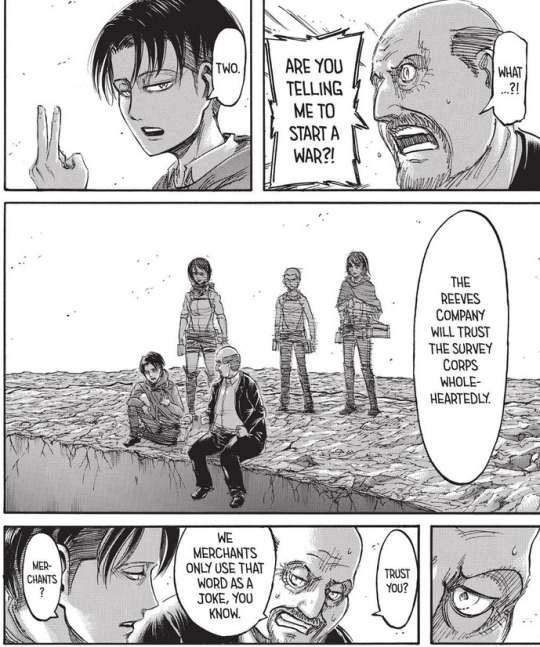
When Levi is laying out the conditions for the deal, it is evident that Dimo does not seem initially receptive. Levi uses the word "trust," which Dimo balks at.
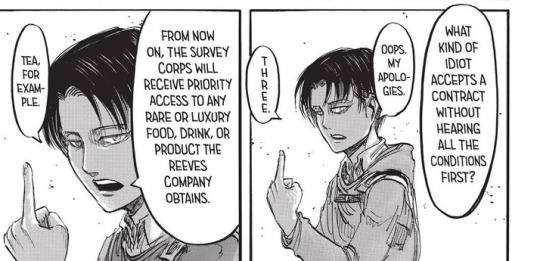
However, Levi's third condition, which is actually the most unimportant and superfluous one, results in Dimo accepting the deal. Why?
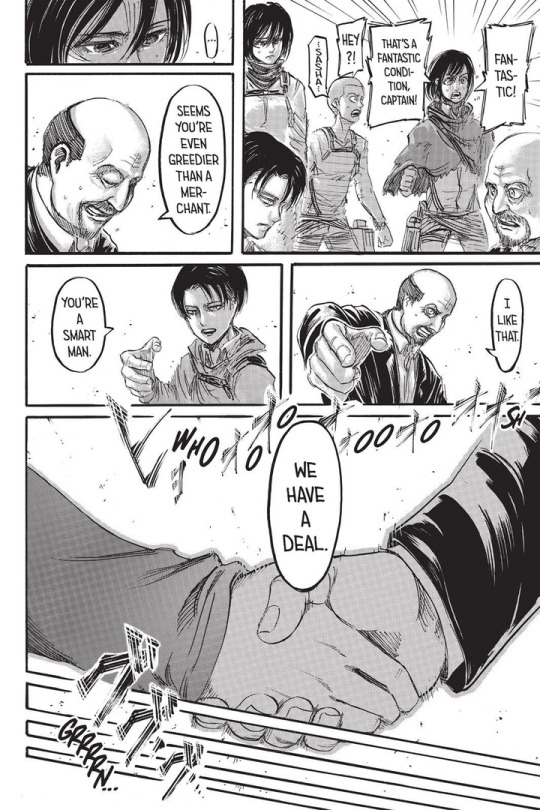
"Seems you're even greedier than a merchant." Dimo says this, as he is familiar at interacting with and respects other merchants. Levi added the third condition in, not simply because he wants tea and other luxurious goods, but because it brings himself down to Dimo's level. Without this condition, the deal may not have gone through. It is exactly this condition that results in Dimo "trusting" Levi as an equal.
This negotiation is also more evidence toward Levi's ability to think long-term. This deal between the Scouts and the Reeves Company benefits the Scouts for the remainder of the series.
III. Luring Kenny Into a Bar

Expanding on Levi's ability to make quick decisions while in the midst of battle, one of the best examples of this is Levi's first encounter with Kenny during the Uprising arc, where Levi lures Kenny into a bar and is able to defeat him as a result.
This goes beyond Ackerman prowess, as that is more related to superhuman strength and heightened combat reflexes. This is specifically a feat of intelligence; it's a sign of Levi's ingenuity—using aspects of the environment to his advantage. By luring Kenny into a bar, Levi is able to procure a weapon to even the playing field. Kenny himself is impressed and adds in that Levi was not taught these tactics by him. Some of the specific tactics of note:
III.a Use of Reflection
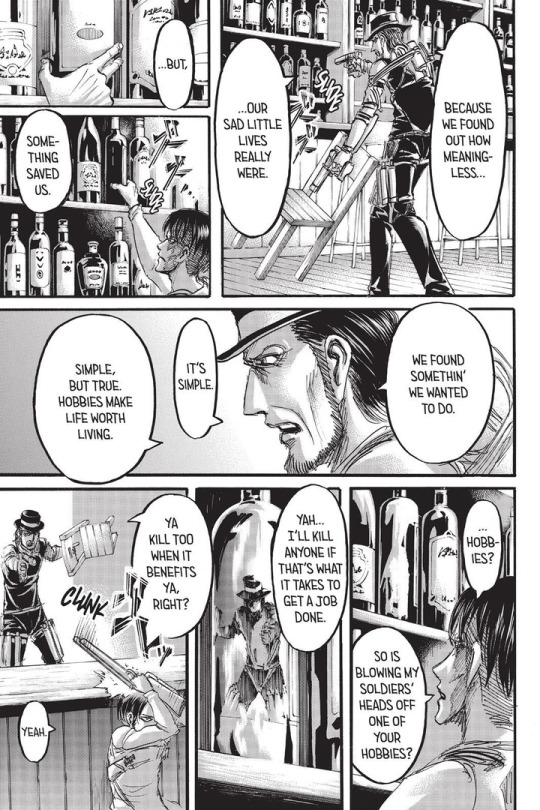
Levi is able to procure a shotgun while simultaneously taking cover from Kenny. He converses with Kenny to keep Kenny focused on him and not the bar's patrons, and even though Levi is facing away from Kenny, he uses the reflection off the alcohol's glass to properly aim the shotgun.
III.b Chair and Figuring Out the Firearms' Weakness
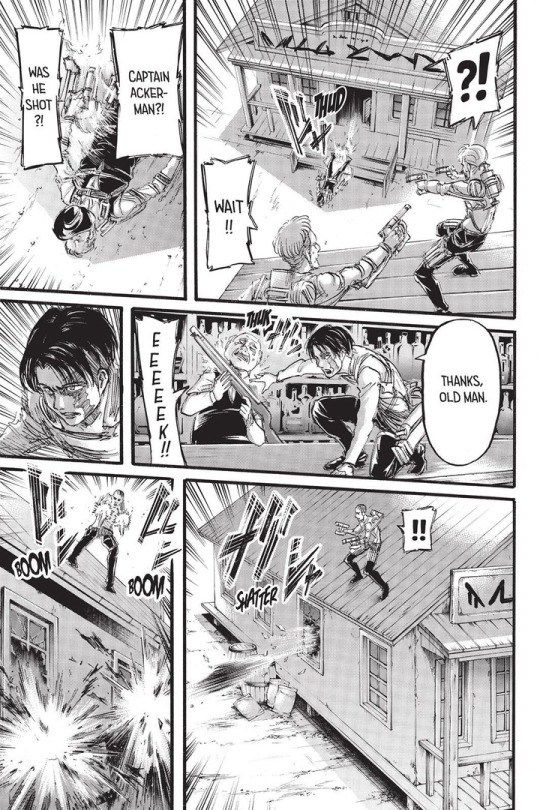
Levi knew he was going to be ambushed from up top as soon as he left the bar, so he threw a chair out the window to both distract and waste his opponents' shots. I'm fairly certain Levi was the first one to notice the main weakness of the anti-personnel vertical maneuvering equipment.
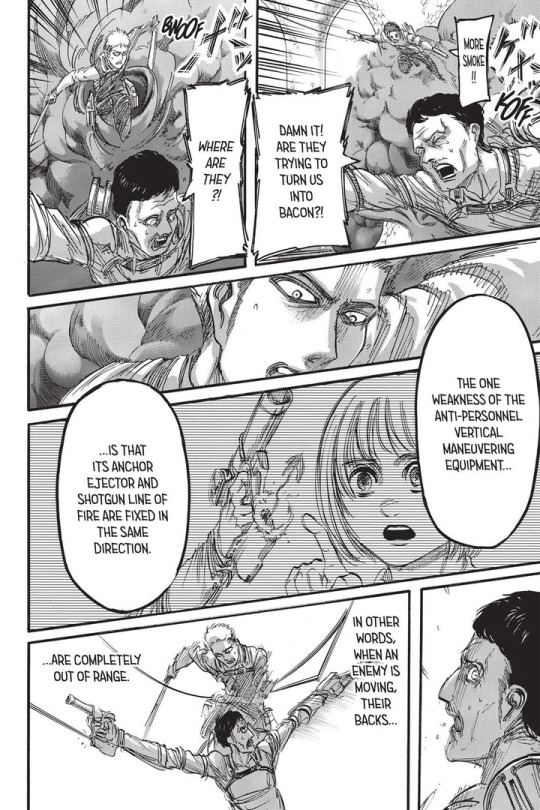
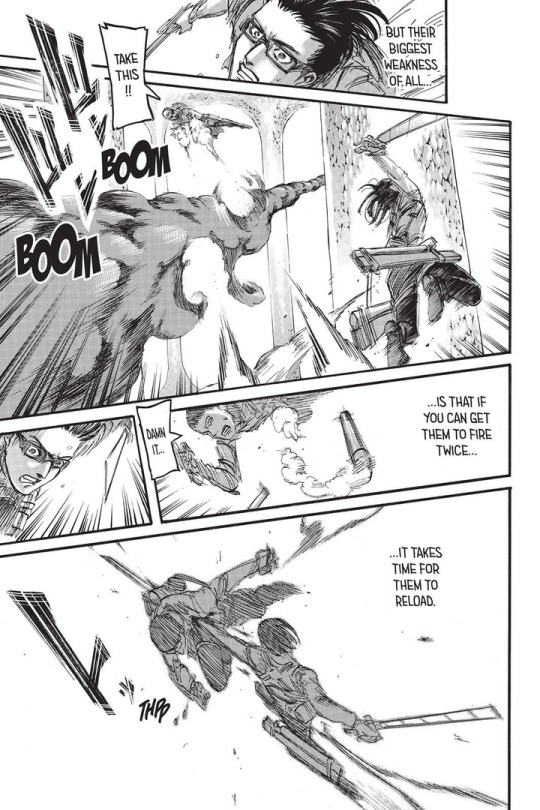
The main weakness, as Armin explains above in a later chapter, is that they need to reload after shooting twice. Levi first threw a chair, forcing one of his opponents to shoot twice, kills that opponent, and then uses that opponent's body as a shield against the other two guys' shots.
IV. Final Battle - Infers Immediately Armin is Alive
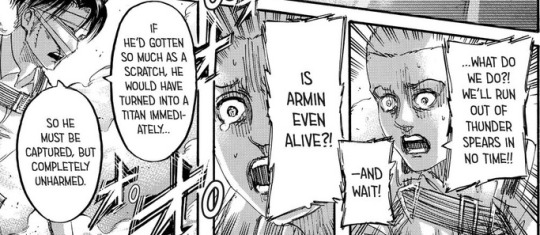
This one is pretty self-explanatory, but Levi is the first to infer that Armin has to be alive, given the way Titan powers work. As such, Levi is able to keep the others focused on the battle in front of them, knowing that Armin is alive and unharmed. This again speaks to Levi's quick thinking while in the midst of battle; it is often more difficult to make these sorts of judgments while in a fight-or-flight situation. Keep in mind as well that Levi is also grievously injured here, so it is even more impressive, how quickly he's able to make this inference.
V. Final Battle - Leadership and Planning
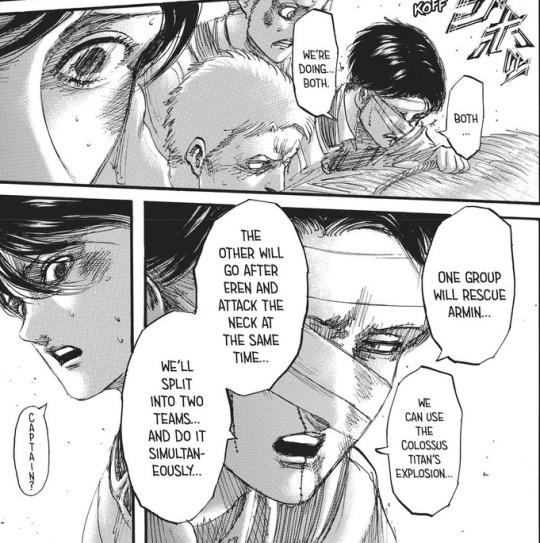
Full stop, the Alliance would not have succeeded without Levi, and part of that is because of Levi's ability to take charge and come up with a plan. This is the plan that they followed throughout the entire duration of the Battle of Heaven and Earth, and it is a plan Levi came up with, directly in response to an unexpected change in circumstances.
This again shows off Levi's skill in adjusting tactics to achieve a strategic objective. Even though the commanders are the ones often in charge of this, Levi is clearly very capable and adept at this himself. Right before this panel, everyone was arguing on how to proceed. Levi came up with the best overall plan, and in addition to that, formulated the two teams required to carry out that plan.
#attack on titan#shingeki no kyojin#levi ackerman#levi aot#aot#snk#attack on titan meta#aot meta#levi ackerman meta#c: levi ackerman#c: dimo reeves#aot.meta#meta.levi#my thoughts
262 notes
·
View notes
Text
Just watched the last episode of AoT, and man it's wild that I started reading the manga and watching the show when I started high school and now it's finished as I graduate college
Anyways, here are my shower thoughts:
Attack on Titan is a tragedy. Obviously. Eren is young, foolish, and emotional, as many tragedy protags tend to be, ala Hamlet.
But what I think a lot of people take issue with is that a lot of people tend to view the story thru a shounen lens of the main character is the good guy and is always fighting for what's right, and once he wins, everything will turn out great - which is ahem not aot in the slightest
And I think that's how you get all those people showing their support for one side or the other, especially with the jeagerists. Cuz Eren's the main character and ofc he's in the right, he's the mc!
But that's not what a tragedy is about. It's not about the epic fights or about defeating a single opponent and then everything turning out dandy. It's about the consequences of your actions, no matter your intentions, and the cycle of anger and violence that keeps ever turning. And Aot is a really well written tragedy in my opinion! It really spells across how hopeless you are in the face of war and violence and how this violence can create people who believe they're doing right but are actually just causing more death and destruction (really my mind is just going crazy with the Hamlet/Eren parallels here). Eren is 19, angry, traumatized, and trapped by all this crazy future and past knowledge that can't be good for his psyche obviously. He's not the same as a shounen protag, you can't expect him to be in the right, and for everything to turn out okay after what he's done, basically. Tragedies end in tragedy unfortunately
Anyways tldr: Aot is a tragedy and Eren is a literal 19yo who was not gonna make the right decisions and that's the point - and not enough people view it this way. I haven't seen people's reactions to the anime finale yet but I feel like quite a few people might not like the ending, or who knows maybe I'll be pleasantly surprised
#viridi posts 2023#attack on titan#aot spoilers#attack on titan spoilers#snk#aot#aot anime finale#aot anime#aot meta#my thoughts#viridi speaks
71 notes
·
View notes
Text
Just sitting down, thinking about the end of AOT for the tenth consecutive hour. I have seen some people point out how freaking sad and depressive the ending is and how the ultimate message that Isayama wanted to convey is that violence and human conflict are inevitable. And yet, although that is definitely one of the many messages he has left behind, we should also remember the other message that he left, and that is that we can’t give up. Yes, violence will persist and murder will continue to happen over and over again, but it is the act of working toward peace and keeping it the hardest decision to take in a world where shooting a bullet is the easy way out.
Violence is inherently human but so is the desire to have and be in peace. Because we might all have violence within us, but we also have the innate need to have a peaceful life
#the world is cruel but so beautiful#ughhh#i need therphy so bad#my head is full of just aot#there is no space for anything else#aot meta#attack on titan the final season#attack on titan#shingeky no kyojin#armin arlert#eren jeager#mikasa ackerman
254 notes
·
View notes
Text
“aot isn’t peak”
literally season 1 EPISODE TWO:


#bye#eren jaeger#eren yeager#eren aot#eren attack on titan#attack on titan#aot#snk#snk meta#aot meta#attack on titan eren#aot.pic
168 notes
·
View notes
Text
Armin’s character and what he represents about bravery within the story means so much to me.
I feel like so often in shonen and general action story media traits like ‘bravery’ and ‘courage’ are considered synonymous with strength or risk-taking- and that’s certainly accurate in a lot of cases. But just like in so many other ways, AOT subverts or critically examines this trope within its characters- particularly in the main trio of the cast.
It’s so easy to reduce Armin to his easiest defined trope- the smart one- and while that’s definitely true and you could write a million meta essays on his intelligence, strategic thinking, etc, I think we don’t talk enough about the ways Armin’s character begs the audience to reexamine what it means to have strength and bravery.
Armin’s strength is not in the physical realm (although it’s worth dedicating another post entirely to the fact that Armin is certainly not that weak either- simply the weakest of an already exceptional group) and his strength is not solely his mind either. But also his determination, conviction, and the way he is willing to sacrifice himself to save others with hardly a second thought- all while not being as rash as Eren and Mikasa can be.
In a recent rewatch of the Trost Arc, there were so many moments that stood out to me that I had previously either taken for granted or not noticed the significance of. In that arc alone, after Eren’s “death” -
He follows Mikasa without hesitation to rescue her when she runs out of gas
Offers Mikasa his gas canisters and blades knowing he won’t survive without them
Defends Eren to the Garrison (this is obviously a pretty big moment that isn’t usually overlooked, of course)
Rushes off from the decoy squad and runs the ENTIRE length of the Trost district wall when he sees the red smoke flair- just to be there to help Mikasa and Eren
Stays by Eren’s titan form on foot in a titan infested area right before he places the boulder
And there’s probably some more I missed.
Armin at this point in the story has no false confidence about his ability to survive- in fact he probably has an abysmal lack of confidence that he can’t affect much, but he does it anyway.
(Obviously, this self-sacrificial tendency reaches a head and ultimately culminates in the sacrifice of his life in the mission to retake Shiganshina…)
All of this to say, what Armin represents about bravery and courage is so important to me because he dedicates his life with the purest of intentions- he is not scared of death in such a noble way and he brings it up again and again. He would die for the cause- nearly does.
Which I think creates an interesting parallel between him and Eren in the sense that Eren is frequently referred to as a “suicidal maniac”- clearly meant to refer to the reckless way he rushes into danger. Whereas Armin’s instinct towards self-sacrifice is never viewed this way, because it’s not a glaring flaw in the same way that Eren’s behavior is.
Another way the story examines this is through his interactions with Annie- who is opposite in that she is fiercely dedicated to her own survival at any cost. This is brought up in their interaction during the ODM gear inspection when she asks him if he would die if someone ordered him to and he easily answered that he would. Armin’s ability to understand this difference between himself and Annie without judging her for it is also unique to him.
Because Armin doesn’t expect anyone else to give their life or view others as cowards for not rushing into danger- because he sees the value in every life. He just feels the cost of his own life would be worth it to preserve someone else’s. It’s this love for humanity and unwavering optimism at the core of his character that gives him so much conviction.
And like so many others have pointed out, this is what saves him (and, to an extent, later the world) in the end when it comes to Levi’s choice to revive him. Erwin was successful because he was able to set aside his humanity and sent countless soldiers to their deaths to gain victory. Armin, more than anyone else in the story, was able to plan and make a difference in such a way that always assumed he would either ask others to take an equal risk or put himself at more risk to reach the goal. And he wasn’t driven by anger, hatred, or rage to do it.
Clearly, there’s a lot that can be said about the way Armin shows strength and bravery in dire situations without being, stereotypically, the strongest character- or even the die-hard risk taking typical protagonist that Eren represents for most of the story.
But I think ultimately the story is trying to show us that Armin’s version is the version that is within reach for everyone- and that will make the biggest difference in not just winning a battle but in making a better world. And it’s so important to me that AOT- despite being such an inherently violent story- took the time to present that message as emphatically as it did.
#armin arlert#eren yeager#annie leonhart#levi ackerman#erwin smith#aot meta#aot analysis#long post#character analysis#this is the result of three days of brainrot rattling my skull#armin is best boy material but like in a viscerally literary way okay?
67 notes
·
View notes
Text
hitch is jean in a different font
i might have a new WIP or two cooking, and one of them has me vibrating and combing over canon to make this argument: hitch as jean's shadow, their parallel journeys, her growth only a few months behind his. marlowe as a kind of marco, stohess as her trost.
for me it's all toward a reijean / hitchannie agenda but pray any hitch and jean stans appreciate:
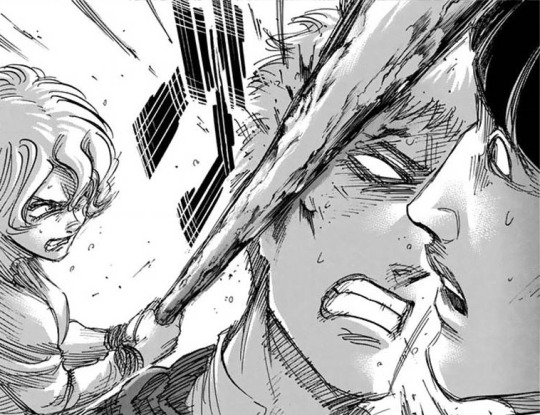
we meet hitch as an almost-jean: well-aware of what the military police actually is. pragmatic. in the anime's expansion of stohess, jean looks at the MPs scrambling and thinks, "i could've actually been one of them too, huh? just how did i end up here instead?"
the scene of marlowe and hitch cleaning up stohess is another anime addition, in the s2 premiere. marlowe is bewildered that titans were in sina to begin with, but hitch's focus is more mundane: "the worst thing about it all is that so many people died for no good reason." the hulu subtitles are more like "there's no official reason all these people died." levi echoes the sentiment in 59 when he bluntly tells them annie was the female titan: "no one knows a damn thing."

levi trusts jean to feel them out for a reason, and i think hitch impressed him way more than marlowe. he respects her disgust for loss of life, and her balls to blame the survey corps for it. she's actually a mini nile dawk there, to me, when nile realizes what erwin is up to in stohess, and it makes me think that jean's pragmatism is a necessary injection of the MPs' better traits into the suicidal SC. that it's in the same chapter as jean and armin recovering from their run-in with the interior squad is telling.
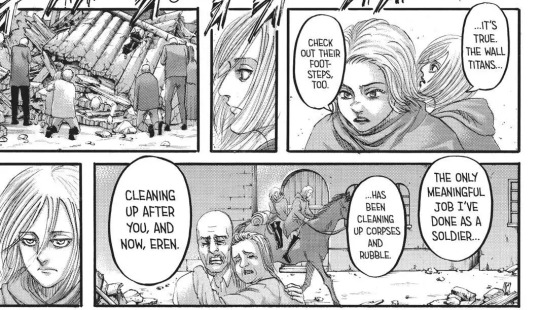
in the 125 hitch/annie date, annie is looking up at the colossals, and hitch literally grounds her. annie is struck by their height, maybe she thinks of bertolt, maybe she's thinking of her mission to prevent this from happening, but hitch doesn't give a shit about the titans themselves, only what they leave in their wake. it feels similar to jean telling eren about marco's death in 22. marco instilled in jean that a leader is honest about what they ask people to die for; hitch is disgusted by the senselessness of the death her whole career has been about cleaning up.
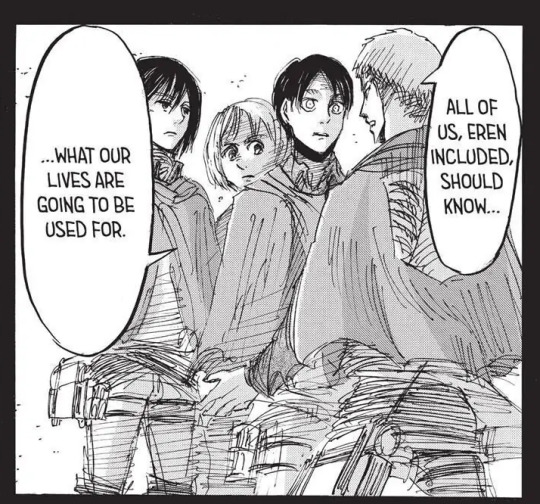
i think it's easy to look at hitch yawning among the jaegerists in 139 as a bit of her cockroach quality—keeping her head down and saluting along for her survival among fascists, like shadis advises the recruits who beat him (also in 125). but we have seen her demonstrate such kindness, and mourn. practically, she must be pissed that the junta she and marlowe risked themselves to install has been totally upended; she stands by her actions in the uprising arc, look at how she and armin witness zackly's assassination. but beyond that, she hates death more than anything. she could reason that marlowe's death was toward something tangible, the truth of their world, but that it snowballed into the death of most of the world? the rumbling is probably a national holiday to those freaks. it's ghoulish to her.
for my ship agenda (even if you're into these relationships only platonically):
hitch talking to annie's crystal feels like jean saving reiner in shiganshina. everyone else was ready to discard or forget about these traitors, but hitch, jean, and armin all cling to the softness they couldn't reconcile with annie and reiner's titan forms. with what he thought were his dying breaths, reiner delivered ymir's letter. on her day off, in Wall Sina, Goodbye, annie kept her word, and tried to reunite a father and daughter. hitch might have negged her for it, seen it as busy work, but it's the same kindness she bullied marlowe for, if carefully buried under annie's insistence that it was just the quid pro quo between them.
idc that armin talked to her, too, or he knew her longer. hitch fuckin mourned her!! and i think being angry with annie, questioning her for four years, is way, way more humanizing than armin basically monologuing at her while feeling sorry for himself and bertolt and titan shifters generally. (this sounds like i hate armin but swear i love him; i just think aruani is most interesting when bertolt is involved.)
hitch accurately clocks that annie seemed afraid of getting close to people. her own fellow cadets just thought of her as distant, bored; when hange asks the scouts in the 104th about RBA's interactions as cadets, they're at a loss, even armin. even her fellow warriors didn't really see her. annie's distance was a kindness, and her own armor. she sees reibert's deep cover as a waste of time, but i think she also sees they're bound to hurt themselves and their mission in the long run. even though everyone felt betrayed after stohess, reiner was a greater shock, a deeper wound. i think annie wanted to minimize hurt on all fronts. (look how she dips out of the alliance, it's because she's tired, and doesn't want to kill eren, or anyone.)
jean comes to understand reiner only after he and connie and armin have to kill their 104th classmates at the pier. hitch can't fully fathom annie's circumstances or pain, especially not annie saying she'd do it all again, but hitch listens to it all and thanks her for the vulnerability, for softening, which is more compassion than most of the paradis side of the alliance has managed so far. she has a head start on the emotional strides jean makes in between 127 and 133, maybe because she got a bit of catharsis beating her fists against annie's crystal for four years.
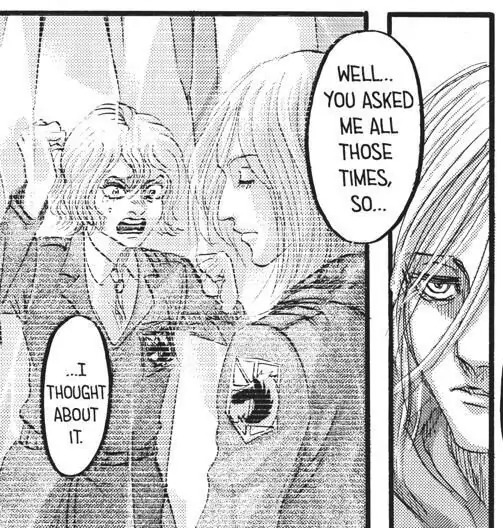
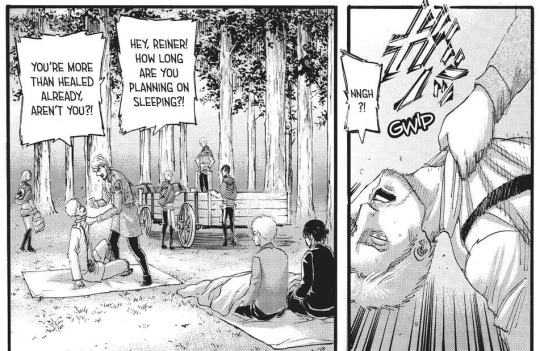
they're both sick of their shit
#hitchannie#hitch dreyse#jean kirchstein#hitch x annie#reiner x jean#aot meta#hitch is levi's favorite MP#♃#aottxt#reijean#jeanbo#snk 125#snk 59
39 notes
·
View notes